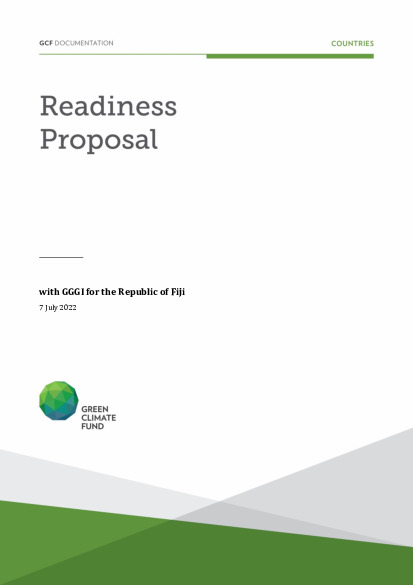Enhancing Direct Access to Climate Finance in Fiji – Phase 2
Fiji, as a Small Island Developing State, faces extreme climate vulnerability. Climate change is affecting all areas of life, including reduced agricultural and fisheries productivity, declining health outcomes, eroding shorelines and riverbanks, shortage of water and higher infrastructure costs.1 The current average asset losses due to tropical cyclones and floods are estimated at more than FJD 500 million per year, representing more than 5% of Fiji’s GDP. Furthermore, while Fiji’s national CO2 equivalent emissions make up a mere 0.006% of global emissions2, Fiji has submitted its Updated Nationally Determined Contribution (NDC) and set significant emission reduction targets, including a net-zero emissions goal for 2050.3The Fijian Government has taken steps to put in place the policies and strategies needed to coordinate and respond to climate change including an NDC Roadmap, NDC Investment Plan, Fiji Low Emission Development Strategy (LEDS), National Adaptation Plan (NAP), National Climate Finance Strategy (NCFS) and Climate Change Act of 2021 (CCA).
However, significant external finance and technical support is needed to achieve the adaptation and mitigation goals and put into action the investments which have been articulated. Over the last two years progress has been made, including with the approval of Fiji Development Bank (FDB)’s first GCF project as a direct access entity (DAE), completion of a Country Programme by the Climate Change and International Cooperation Division (CCICD)/National Designated Authority (NDA) as well as the Ministry of Economy (MoE) submitting its application to become an accredited entity to the GCF. However, gaps still remain to build capacity of the NDA to be able to provide a fully inclusive, equitable and transparent interface with stakeholders, project developers and accredited entities with the need to train more staff and new staff coming in on the NDA portal and assess its use and improvements needed for effective information services, provide training on the no objection processes and supporting the Sectoral Working Groups (SWGs) to be fully utilized by the NDA. To complete the accreditation of MoE there is a need for technical assistance to meet Stage II requirements as well as provide training on the newly established gender and environmental safeguards as well as lack of standard operating procedures (SOPs) for those policies which still need to be developed. Also essential is to build its pipeline and capacity to submit projects. MoE needs to start preparing concepts notes for GCF approval so it is well prepared when accreditation is received to proceed to project implementation quickly. FDB entered into an Accreditation Master Agreement (AMA) with the GCF on 5 November 2018 and will apply for reaccreditation. It also aims to meet the requirement for accreditation upgrade to environment and social safeguards (ESS) Category B and small-size projects. FDB thus requested for support to review its compliance with the GCF standards and policies, and to assess, enhance and strengthen FDB’s capacity to upgrade its accreditation level to further implement its project pipeline. This proposal therefore aims to further support the NDA, the MoE and FDB to strengthen their capacities for stakeholder engagement, project identification, design, development, monitoring and evaluation and prepare and submit concept notes and Project Preparation Facility applications to the GCF. This will enable a full operationalization of direct access to climate finance through FDB and MoE, building on the stakeholder engagement mechanism established in Phase 1 (SWGs and NDA Portal), capacity building and project pipeline development which was done under Phase 1. The solutions this Readiness proposal aims to address are:
- Ensure that the NDA staff are trained and the policies, procedures and stakeholder mechanism necessary to fulfil the NDA’s role in an inclusive, equitable and transparent manner are fully operational, including a strong engagement with sub-national institutions and organisations and the private sector.
- Support MoE to submit its Stage 2 application for accreditation to the GCF and respond to and fulfil requirements which are identified and strengthen MoE capacity through capacity building, operationalization of policies, establishment of SOPs and prepare for submission of projects to the GCF.
- Institutional and capacity building support to the FDB, including training to staff and development of new procedures to enable FDB to move towards accreditation upgrade application.
- Development of a project pipeline by prioritization of projects, development of concept notes and completion of pre-feasibility studies and PPF applications for both MoE and FDB.
This Readiness grant's direct beneficiaries are the NDA, MoE, FDB, sub-national stakeholders, potential executing entities and key private sector stakeholders.
